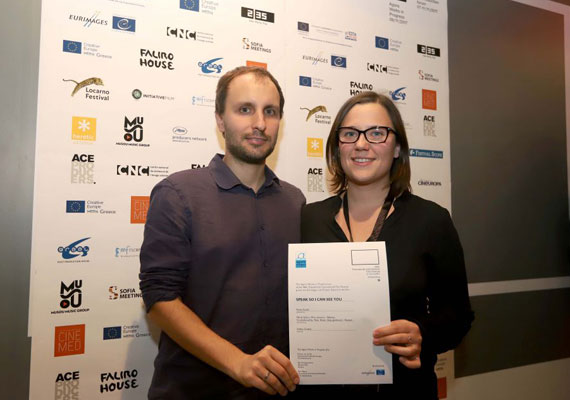Marija Stojnić and Milos Ivanović • Director and producer
“A film that reinvents the purpose of live, old-school, spoken-word radio”
- The winners of the Eurimages Lab Project Award at Thessaloniki, director Marija Stojnić and producer Milos Ivanović, discuss their winning project with us

The experimental documentary Speak So I Can See You, directed by Marija Stojnić, was the big winner of the €50,000 Eurimages Lab Project Award in the Thessaloniki IFF’s Agora Works in Progress section (see the news and read the report). The film, which explores the importance of Radio Belgrade, is being produced by the director and Milos Ivanović for Bilboke. Cineuropa talked to them about the creative part of this unconventional project and how the award will help them to finalise it.
Cineuropa: Could you give us some more details regarding your project?
Marija Stojnić: With Speak So I Can See You, we primarily wanted to connect strangers from the two opposite ends of the radio signal, the listeners and the creators. I started making this film from my own experience because Radio Belgrade affected my life and my perception of reality – and also my city and my country – in such a profound way. I thought it was an interesting topic to export through a non-linear, unconventional film that will play with image and sound in a different way to classical documentary films.
What is the unconventional aspect of your film?
MS: This film is set at the intersection of an observational documentary and an audiovisual experiment, and the story follows the transformation of one of the oldest European radio stations and Serbia’s only radio station, which broadcasts cultural, dramatic, artistic and scientific programmes. It’s a documentary where the radio becomes a self-aware, living character that sees what’s happening inside it and around it, and thinks and talks through the voices of the people who have spoken for the past 90 years on the radio. Technically, it’s this archival footage from the vast archive of Radio Belgrade that becomes the voice of the radio.
Are you trying to connect the past and the present through this storyline?
MS: Through this human heritage that radio gives us through sound archives, we’ve tried to reflect on the present, so it’s also a very contemporary film because it seeks to find the role of art, culture and this kind of programming that’s not very present in the public media today. This is a film that reinvents the purpose of live, old-school, spoken-word radio amidst this global epidemic of loneliness.
Milos Ivanović: Everybody thinks that this is a historical documentary that traces the history and the past of Radio Belgrade, which it definitely is not; it’s actually a very contemporary film.
How important is the role of Radio Belgrade today?
MS: This station is a symbol of culture and critical thinking, and I think for people who are living in Serbia, because of the situation in the media, it plays a transformative and crucial role in their lives. It’s not such a popular station, but it makes you think and is a very immersive and gentle friend that can inhabit and transform your own personal space. As we will see in the film, this transformative power can change the feel of the place, too.
How helpful will the Eurimages Lab Project Award be?
MS: We have already received production support from Film Center Serbia, so we will use the award’s €50,000 to enter post-production in the spring. The archival rights are a huge part of our post-production, and that will suck up time and money, so this is very significant for us. We know that it is a film that is hard to pitch, and Thessaloniki was the best place to present our work in progress because it belongs to this tiny part of the industry that focuses on films that are daring, unconventional and off the beaten path. We know that it’s risky to enter that kind of partnership, so we are really happy that we have received this award.
MI: This award also gives us the option to choose what we think will be the best content to go into our film. With a lower budget, we would have had to make compromises, and now we can remove any creative boundaries.
Are you still looking for another partner?
MS: We would like to work with an international crew because we think that it would add to the quality of the project. We already have our co-producers from Croatia, Tibor Keser and Vanja Jambrović for Restart, but we are still looking for a third European co-producer for the post-production.
Do you have any plans after Thessaloniki?
MI: There are no other festival plans for now, as we will focus on finishing the shoot in the next couple of months and will then start the editing.
Did you enjoy reading this article? Please subscribe to our newsletter to receive more stories like this directly in your inbox.















